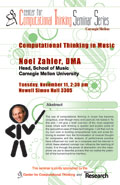 Noel Zahler,
Noel Zahler,Head, School of Music, Carnegie Mellon University
Computational Thinking in Music
Tuesday, November 11, 2:30 pm, Newell Simon Hall 3305
Video
Abstract
 The use of computational thinking in music has become ubiquitous, even though many end users do not realize it. To this end, I will give a brief overview of the most essential areas where such thinking is applied and explain some of the speculative uses of these technologies. I will then turn to my own work in building compositional tools and score following to explain how the formalization of musical thought for composers and the analysis of performance practice have influenced my work as a composer and the manner in which these abstract concept can influence the teaching of music. It is through the power of abstraction and the metaphors we use to describe process that we realize the potential of the human/machine interface.
The use of computational thinking in music has become ubiquitous, even though many end users do not realize it. To this end, I will give a brief overview of the most essential areas where such thinking is applied and explain some of the speculative uses of these technologies. I will then turn to my own work in building compositional tools and score following to explain how the formalization of musical thought for composers and the analysis of performance practice have influenced my work as a composer and the manner in which these abstract concept can influence the teaching of music. It is through the power of abstraction and the metaphors we use to describe process that we realize the potential of the human/machine interface.
Bio
Noel Zahler directs the School of Music and teaches composition. Zahler has a DMA in music Composition from Columbia University; an MFA degree from Princeton University; a certificato di perfezionamento from L’Accademia Musicale Chigiana in Siena, Italy; and a bachelor’s degree from the Aaron Copland School of Music at CUNY Queens College. His awards and prizes include a National Endowment for the Arts Consortium Commission; a Fulbright/Hayes Fellowship to Italy; an Italian National Research Fellowship; two McDowell Colony Fellowships; an Aaron Copland Foundation Grant in support of recording; a Connecticut Commission on the Arts Individual Artists Grant; and a Connecticut Public Television (CPTV) prize for the sound score to the computer-realized video “Gothic Tempest.” Zahler’s compositions include a wide range of vocal, instrumental, electro-acoustic, interactive and multimedia works. In addition, Zahler is the co-author of three computer software programs, the “Artificially Intelligent Computer Performer,” “Score Follow” and “Music Matrix.” He has published on music theory and composition, artificial intelligence and music, and computer music.
